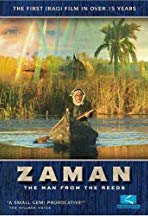
ZAMAN, THE MAN WHO LIVED IN THE REEDS
Iran/France, 2003, 75 minutes, Colour.
Sami Kaftan.
Directed by Amer Alwan.
An Iraqi/French co-production, filmed in January, 2003, as America and the Coalition prepared to invade Iraq and topple Saddam Hussein. The director has stated that he wants his film to be a message of love to all people and he avoids blaming Americans or the former dictatorship. He wants to show images of Iraq and its people, other than those so often seen in the media. Of course, his film takes on an added significance in the hindsight of the war and its aftermath..
The film is simplicity itself, a film about goodness. Zaman is a man of the marshes, a long-believed location of the garden of Eden, the marshes at the junction of the Tigris and the Euphrates. It is a striking land and waterscape, all the sadder for its drying up and the people being relocated. It was a favourite place of the director who offers a prologue to the film, introducing us to the marshes, their wildlife and their beauty.
Zaman wakes, goes about his river ablutions, greets his ailing wife, the boy he has adopted after his parents were killed in a bombing raid, goes about his work with thatching the reeds and takes his wife to the doctor and learns that he needs to travel to Baghdad for medicine. His journey takes him into the bustle of the city, to pharmacies that do not stock what he wants and to the Catholic hospital where Allah and providence and a kind assistant get him the medicine rather than the cavalier director. Then back again.
Sami Kaftan's Zaman is a man of bearing and dignity, of faith and prayer, of a tradition of workers who do not deserve to be caught up in the oppression of Saddam (whose pictures appear frequently but which soon will be torn down). We hear snippets of news from the radio, about Congress and its budget allotments for the war. We hear the jets flying overhead. But life must go on and it is to the credit of this film that it offers a picture of a traditional and simple way of life, of basic values and humanity in a land that was headlines at the time of filming and continues to be.
1. The impact of the film? Made just before the outbreak of the war in Iraq? Life in Iraq, the marshlands, the city, the anticipation of war?
2. The location photography, the marshlands? The prologue, the director and the commentary, his own personal love for the terrain? The land, the reeds, the water?
3. The people who lived on the marshes, their way of life, homes, work in thatching the reeds? The women and their keeping care of the house? Friends, neighbours, care? The adoption of the boy whose parents were killed in the war? The children in the village?
4. The contrast with the city of Baghdad, the bus ride, the crowded streets, the markets, the traffic? The shops, the hospital? The people, unfriendly? Friendly?
5. Zaman and his age, experience, long life in the marshes? His tender love for his wife, his adopting the boy, his work? His dignity, the daily routine, washing, breakfast, the talk with the boy, work?
6. Taking his wife to the doctor, the need for the medicine? His decision to go to Baghdad? The experience in Baghdad, the trip, walking the town, asking at the pharmacies? His going to the hospital, the attendant, her attitude, his returning to get the medicine, his gratitude, his prayer for the director? His return, the gifts that he brought back?
7. The morning, beginning his routine, his wife not up, discovering her dead? His silent grief, going out to the boy, their sitting under the tree, the boy repeating his words about the palm tree, still there, fruitful? Feeding people? The advice that he had given to the boy?
8. The portrait of the wife, getting up in the morning, the mirror, her illness? Getting the breakfast? The doctor? The neighbour taking care of her? The return, his gift, the medicine? The pathos of her silent death?
9. The boy, his background, grieving, sullen, with the other children? In the household? With Zaman, Zaman giving his advice - and the boy giving him his advice back?
10. The attendant at the hospital, the regulations, her compassion for Zaman, her interactions with the director, his wanting to cover up things, her decision to give the medicine to Zaman, even without cost? Zaman never knowing the actions of the director?
11. The atmosphere of prayer, the daily prayer, Zaman in the morning, the God-language of blessing? His visit to the mosque in Baghdad, the beauty of the mosque, the people praying? His sleeping the night on the mat? The permeating of Iraqi society by Islam? Surface, depth?
12. The intimations on radio about the war, the American Congress, Jacques Chirac and other nations? The planes flying overhead?
13. Audience knowledge of what happened in 2003, the toppling of Saddam (and all the photos of him and pictures of him in Baghdad)? The change of regime? The occupation? The people in the marshlands? The drying up of the marshlands and the moving of the people?
14. A chance to see the people of Iraq?